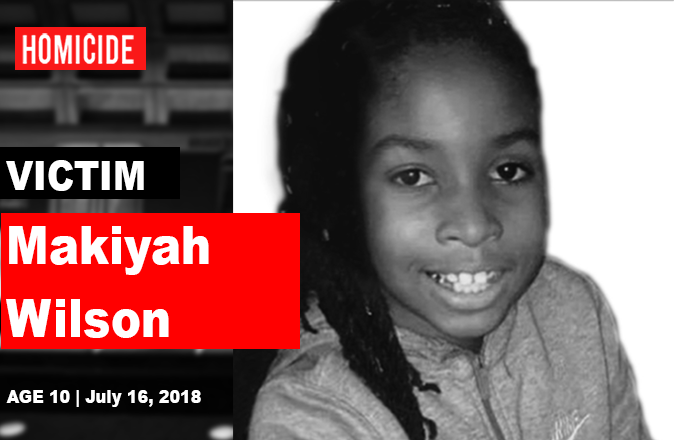
Thank you for reading D.C. Witness. Help us continue our mission into 2024.
Donate NowBy
Adriana Marroquin
- May 25, 2023
Court
|
Daily Stories
|
Homicides
|
Shooting
|
Suspects
|
Victims
|
On May 23, defense attorneys for four of six defendants in a homicide and conspiracy trial presented their closing arguments.
Gregory Taylor, 27, Quentin Michals, 25, Qujuan Thomas, 24, Darrise Jeffers, 23, Isaiah Murchison, 23, and Marquell Cobbs, 21, are six of 10 defendants charged with first-degree murder, criminal street gang affiliation, conspiracy, possession of a firearm during a crime of violence, assault with intent to kill, and other charges regarding a fatal drive-by shooting that resulted in 10-year-old Makiyah Wilson’s death. The shooting happened on the 300 block of 53rd Street, NE on July 16, 2018.
Defense attorneys for Taylor, Cobbs, Thomas and Jeffers made their final plea to the jury on their clients’ behalf.
“I hope you have the wisdom, strength, and integrity to give a fair verdict,” Jonathan Zucker, Taylor’s defense attorney, told the jury.
“Six young men’s fates will be put in your hands… I ask that you also give justice to the accused,” he continued.
Kevin McCants, defense attorney for Cobbs, argued that Cobbs’ only involvement in the case was being contacted by the alleged driver of the black Infiniti on the day of the shooting asking him to get Michals to call him, and relaying that message.
“[Cobbs] is being wrongfully accused, and overly prosecuted,” said McCants.
Like other defense attorneys, Julie Swaney, Thomas’ attorney, argued that the prosecutors’ theory for this case does not make any sense, stating that there are way too many missing pieces in their arguments.
She insisted that Thomas’ way of portraying himself on social media was merely a persona he was trying to create, and there is no evidence that proves the way he acted online is the way he conducted himself in real life.
“Having conflict with someone online doesn’t always turn into real life violence,” she stated.
According to Swaney, the prosecutors want to scare the jury by showing them things that would typically not happen in their neighborhoods but may be more likely in neighborhoods like Wellington Park, Clay Terrace, Potomac Gardens, and other neighborhoods classified as dangerous in the city. The shooting took place in Clay Terrace.
She argued that the prosecutors lumped Thomas in with everyone else to facilitate their ability to connect all the evidence.
“[The prosecutors] need you to make leaps of logic,” she argued.
Separately, Joseph Caleb and Phil Andonian, defense attorneys for Jeffers, argued that the jury’s perspective of the evidence is what’s most important for their final decision.
According to Caleb, the Wellington Park neighborhood may not be like any of the juror’s neighborhoods, and that they may not understand or like what goes on in Wellington Park, but that doesn’t mean that things that happen in that neighborhood are wrong.
Caleb argued that Jeffers became involved in conversations to purchase guns for the community, which prosecutors claim is part of a conspiracy, when one of his friends, 16-year-old Myangelo Starnes, was murdered in the Wellington Park neighborhood in September of 2017.
“These men were trying to stay safe and stay alive,” he argued, insisting that they purchased guns to prevent themselves from ending up like Starnes.
All defense attorneys asked the jury to return a verdict of not guilty for their clients, stating that there is no concrete evidence that proves any of the defendants’ involvement in the charges brought against them.
Due to time constraints, defense attorneys for Jeffers were unable to conclude their closing arguments.
Parties are expected back May 25.
Follow this case